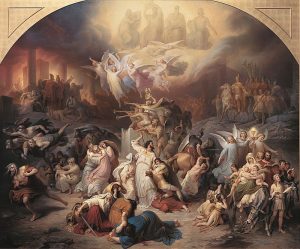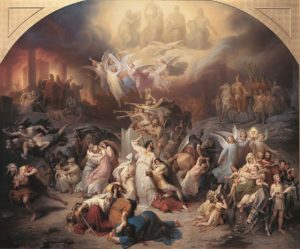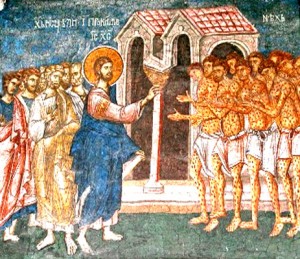Illuminations on the Lectionary readings for Nov. 16, 2025 (Pentecost 23C/Proper 28)

Zerstörung Jerusalems durch Titus (The Destruction of Jerusalem by Titus, 1846), oil painting on canvas by Wilhelm von Kaulbach (1805-1874). Neue Pinakothek, Munich. (Click image to enlarge.)
First Reading (Track One): Isaiah 65:17-25
We are approaching the end of the long season after Pentecost. Next week we’ll celebrate the feast of Christ the King, and then we’ll move into Advent and a new Lectionary year. This first reading is taken from the closing verses of the book of Isaiah. The people have endured the loss of Jerusalem and the temple, spent years in exile, and have finally returned to the shattered city to begin the arduous task of rebuilding. Now the prophet celebrates God’s plan for a new Jerusalem, a joy and a delight. It will be a city with no weeping, no distress … no death in childbirth, no pain … joyous lives of 100 years of youthful strength! And, at the end, the prophet proclaims, it will be a holy place of peace, where the lion and the lamb rest together and none shall hurt or destroy.
First Reading (Track Two): Malachi 4:1-2a
The short book of Malachi, the last of the twelve minor prophets, occupies the final pages of the Hebrew Bible. The prophet, whose name in Hebrew means “Messenger,” speaks of a people newly returned from exile, foretelling that the great day of the Lord is coming. In language similar in tone to the apocalyptic language of the day’s Gospel, the prophet warns that God will separate evildoers from the righteous and destroy them. But those who revere God’s name will have healing and joy, “leaping like calves from the stall.”
Psalm (Track One): Isaiah 12:2-6 (Canticle 9)
In place of a traditional Psalm, we have these verses from Isaiah that are repeated as Canticle 9 in the Book of Common Prayer, “The First Song of Isaiah.” In this passage, which we also read in Morning Prayer, the prophet warns that hard times lie ahead for the people of Israel. They face exile in Babylon, but the prophet assures them that God will remain with them. Even in threatening times, even when they feel frightened and vulnerable, God will be their stronghold and sure defense.
Psalm (Track Two): Psalm 98
In harmony with the prophet Malachi’s vision of God as a righteous healer, this Psalm alternative envisions God as a fair and just judge of the world and all its people. When God comes to judge the earth, the Psalmist foretells, we will sing a new song, lift up our voices, and express our joy so abundantly that even the sea, the lands, the rivers, and the hills will jump up and join the celebration. Then God’s righteousness will be known to all the nations.
Second Reading: 2 Thessalonians 2:1-5, 13-17
“Anyone unwilling to work should not eat.” This harsh judgment is too often echoed in modern times, shorn of its context. We hear it even now amid the government shutdown and loss of SNAP benefits. The original context of this letter, though – written in Paul’s name in a time of Roman persecution – insists that all the Christians in Thessalonica get up and do their share in an existential battle against an immediate challenge. Slacking would have been unfair and corrosive to a group that lived in community. But in no way does this late letter negate Jesus’s command to give food to the hungry, drink to the thirsty, or any of the other ways in which we are called to show love to our neighbors.
Gospel: Luke 21:5-19
Luke wrote this scary forecast of war and destruction for a primarily Gentile audience some 70 years after the Crucifixion and 30 years after the Romans had destroyed Jerusalem and the Temple. He is telling the searing story of an actual event – the fall of the Temple – framing it as a lesson that Jesus taught his apostles during the week of his passion and death. This passage follows a series of arguments with Pharisees and Sadducees that we have heard on recent Sundays. It bears a truth as meaningful for us as it was for persecuted Christians in Luke’s own time: God is with us. Even when we’re betrayed, scorned, hated, and hurt, “By our endurance we will gain our souls.”


